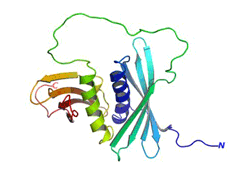
| Serial No. | GA-P0034HU |
| Species | Human |
| Specification | 0.1 mg/0.2mg |
| Brand | GenAsia |
| Origin | Shanghai |
| Price | US$350/US$620 |
Detailed information
1 Host: Escherichia coli (E. coli)
2 Species: Human
3 Protein Type: Recombinant
4 Synonyms: ACDC, ACRP30, ADIPQTL1, ADPN, APM-1, APM1, GBP28, APN, Acdc, apM1, 30kDa, adipo, Acrp30, ADN, MGC84292, ADIPOQ
5 Purity: 95% by SDS-PAGE
6 Application: WB、 Elisa、 Functional Studies
7 Background:
Adiponectin (also called Acrp30, AdipoQ) is an adipocyte specific secreted protein that circulates in the plasma. It is induced during adipocyte differentiation and it secretion is stimulated by insulin. Human adiponectin shares about 83 % amino acid identity with that of mouse and about 90 % with that of rat. Adiponectin plays a role in various physiological processes such as energy homeostasis and obesity. Plasma levels of adiponectin are reduced in obese humans, and decreased levels are associated with insulin resistance and hyperinsulinemia.
8 Storage&Stability:
Avoid repeated freeze and thaw cycle.Store at 2-8℃ for delivery and store at -20 or -70℃ for future use. The loss rate of the target protein which describes the stability was determined by accelerated thermal degradation test.That is to incubate the protein at 37℃ for 48h and no obvious degradation and precipitation were observed.The loss of this protein is less than 5% within the expiration date under appropriate storage condition.
2 Species: Human
3 Protein Type: Recombinant
4 Synonyms: ACDC, ACRP30, ADIPQTL1, ADPN, APM-1, APM1, GBP28, APN, Acdc, apM1, 30kDa, adipo, Acrp30, ADN, MGC84292, ADIPOQ
5 Purity: 95% by SDS-PAGE
6 Application: WB、 Elisa、 Functional Studies
7 Background:
Adiponectin (also called Acrp30, AdipoQ) is an adipocyte specific secreted protein that circulates in the plasma. It is induced during adipocyte differentiation and it secretion is stimulated by insulin. Human adiponectin shares about 83 % amino acid identity with that of mouse and about 90 % with that of rat. Adiponectin plays a role in various physiological processes such as energy homeostasis and obesity. Plasma levels of adiponectin are reduced in obese humans, and decreased levels are associated with insulin resistance and hyperinsulinemia.
8 Storage&Stability:
Avoid repeated freeze and thaw cycle.Store at 2-8℃ for delivery and store at -20 or -70℃ for future use. The loss rate of the target protein which describes the stability was determined by accelerated thermal degradation test.That is to incubate the protein at 37℃ for 48h and no obvious degradation and precipitation were observed.The loss of this protein is less than 5% within the expiration date under appropriate storage condition.








